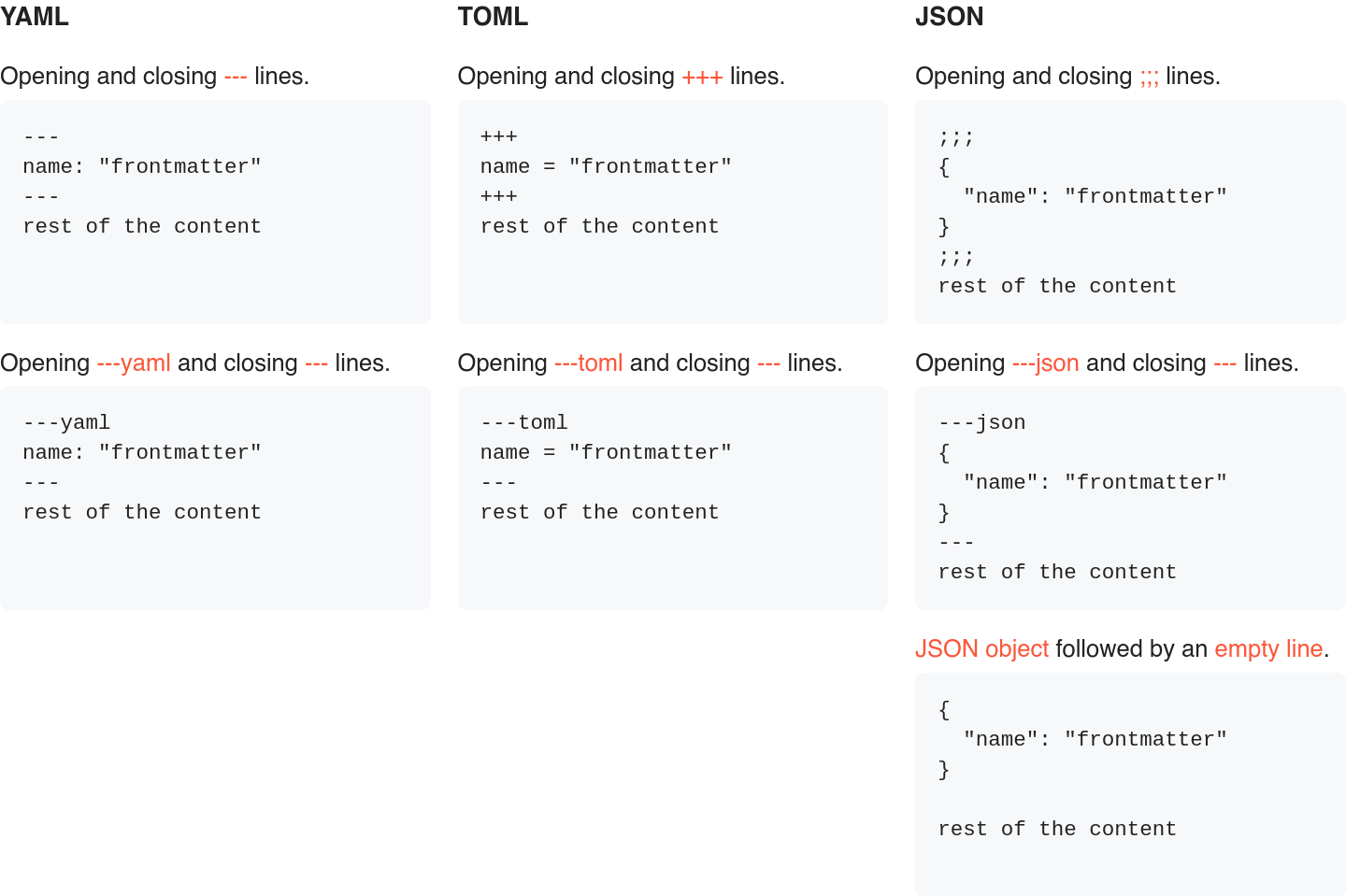 Documentation
¶
Documentation
¶
Overview ¶
Package frontmatter implements detection and decoding for various content front matter formats.
The following front matter formats are supported by default. - YAML identified by: • opening and closing `---` lines. • opening `---yaml` and closing `---` lines. - TOML identified by: • opening and closing `+++` lines. • opening `---toml` and closing `---` lines. - JSON identified by: • opening and closing `;;;` lines. • opening `---json` and closing `---` lines. • a single JSON object followed by an empty line.
If the default formats are not suitable for your use case, you can easily bring your own. See the examples for more information.
Index ¶
Examples ¶
Constants ¶
This section is empty.
Variables ¶
var ErrNotFound = errors.New("not found")
ErrNotFound is reported by `MustParse` when a front matter is not found.
Functions ¶
func MustParse ¶ added in v0.2.0
MustParse decodes the front matter from the specified reader into the value pointed to by `v`, and returns the rest of the data. If a front matter is not present, `ErrNotFound` is reported. Front matters are detected and decoded based on the passed in `formats`. If no formats are provided, the default formats are used.
func Parse ¶
Parse decodes the front matter from the specified reader into the value pointed to by `v`, and returns the rest of the data. If a front matter is not present, the original data is returned and `v` is left unchanged. Front matters are detected and decoded based on the passed in `formats`. If no formats are provided, the default formats are used.
Example (Custom) ¶
r := strings.NewReader(`
...
name: "frontmatter"
tags: ["go", "yaml", "json", "toml"]
...
rest of the content`)
var matter struct {
Name string `yaml:"name"`
Tags []string `yaml:"tags"`
}
formats := []*frontmatter.Format{
frontmatter.NewFormat("...", "...", yaml.Unmarshal),
}
rest, err := frontmatter.Parse(r, &matter, formats...)
if err != nil {
// Treat error.
}
// NOTE: If a front matter must be present in the input data, use
// frontmatter.MustParse instead.
fmt.Printf("%+v\n", matter)
fmt.Println(string(rest))
Output: {Name:frontmatter Tags:[go yaml json toml]} rest of the content
Example (JSON) ¶
package main
import (
"fmt"
"strings"
"github.com/adrg/frontmatter"
)
func main() {
r := strings.NewReader(`
{
"name": "frontmatter",
"tags": ["go", "yaml", "json", "toml"]
}
rest of the content`)
var matter struct {
Name string `yaml:"name" toml:"name" json:"name"`
Tags []string `yaml:"tags" toml:"tags" json:"tags"`
}
rest, err := frontmatter.Parse(r, &matter)
if err != nil {
// Treat error.
}
// NOTE: If a front matter must be present in the input data, use
// frontmatter.MustParse instead.
fmt.Printf("%+v\n", matter)
fmt.Println(string(rest))
}
Output: {Name:frontmatter Tags:[go yaml json toml]} rest of the content
Example (TOML) ¶
package main
import (
"fmt"
"strings"
"github.com/adrg/frontmatter"
)
func main() {
r := strings.NewReader(`
+++
name = "frontmatter"
tags = ["go", "yaml", "json", "toml"]
+++
rest of the content`)
var matter struct {
Name string `yaml:"name" toml:"name" json:"name"`
Tags []string `yaml:"tags" toml:"tags" json:"tags"`
}
rest, err := frontmatter.Parse(r, &matter)
if err != nil {
// Treat error.
}
// NOTE: If a front matter must be present in the input data, use
// frontmatter.MustParse instead.
fmt.Printf("%+v\n", matter)
fmt.Println(string(rest))
}
Output: {Name:frontmatter Tags:[go yaml json toml]} rest of the content
Example (YAML) ¶
package main
import (
"fmt"
"strings"
"github.com/adrg/frontmatter"
)
func main() {
r := strings.NewReader(`
---
name: "frontmatter"
tags: ["go", "yaml", "json", "toml"]
---
rest of the content`)
var matter struct {
Name string `yaml:"name" toml:"name" json:"name"`
Tags []string `yaml:"tags" toml:"tags" json:"tags"`
}
rest, err := frontmatter.Parse(r, &matter)
if err != nil {
// Treat error.
}
// NOTE: If a front matter must be present in the input data, use
// frontmatter.MustParse instead.
fmt.Printf("%+v\n", matter)
fmt.Println(string(rest))
}
Output: {Name:frontmatter Tags:[go yaml json toml]} rest of the content
Types ¶
type Format ¶
type Format struct {
// Start defines the starting delimiter of the front matter.
// E.g.: `---` or `---yaml`.
Start string
// End defines the ending delimiter of the front matter.
// E.g.: `---`.
End string
// Unmarshal defines the unmarshal function used to decode
// the front matter data, after it has been detected.
// E.g.: json.Unmarshal (from the `encoding/json` package).
Unmarshal UnmarshalFunc
// UnmarshalDelims specifies whether the front matter
// delimiters are included in the data to be unmarshaled.
// Should be `false` in most cases.
UnmarshalDelims bool
// RequiresNewLine specifies whether a new (empty) line is
// required after the front matter.
// Should be `false` in most cases.
RequiresNewLine bool
}
Format describes a front matter. It holds all the information necessary in order to detect and decode a front matter format.
func NewFormat ¶
func NewFormat(start, end string, unmarshal UnmarshalFunc) *Format
NewFormat returns a new front matter format.
type UnmarshalFunc ¶
UnmarshalFunc decodes the passed in `data` and stores it into the value pointed to by `v`.








